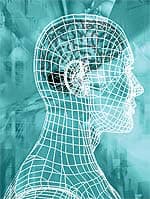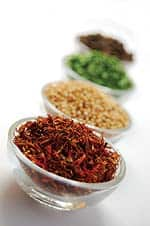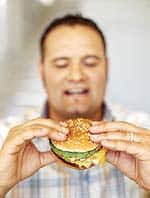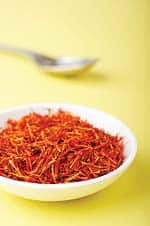Life Extension Magazine®
Do you find yourself routinely eating more than you mean to? Struggle with weight gain because you can’t exercise “portion control?” Feel bad about it—but can’t stop yourself from snacking? In other words, have you ever gotten the feeling that food is addictive? According to the latest scientific findings, you’re right—and a novel natural intervention may now help you bring those urges under control. In a historic study published earlier this year,1,2 a team of researchers demonstrated for the first time that the underlying biomolecular mechanisms driving millions to overeat are identical to those that lock people into the death spiral of cocaine and heroin addiction. This landmark discovery confirms what many clinicians have long suspected: compulsive eating is as much a matter of brain chemistry as behavior.
Of course, no drug exists that can regulate appetite and induce weight loss without significant health risks.3 Some have proven disastrous. It was only after the lethal FDA-approved “fen-phen” drugs were shown to cause pulmonary hypertension and heart valve disease4—that the agency was forced to withdraw it. The exciting news is a natural appetite regulator has been identified that operates at the neurochemical level to help provoke “satiety”—the feeling of being full. This unique extract is derived from saffron, prized for centuries not only as a spice but also as a mood enhancer in traditional cultures.5,6 Here you will learn of saffron’s capacity to boost serotonin, a neurotransmitter whose role in appetite and satiety is well established.3,7,8 You will discover how a team of French researchers uncovered the ability of saffron to dramatically decrease feelings of hunger between meals. You will also find out how just 88.25 mg twice daily of a standardized saffron extract may help you effectively modulate some of the underlying psychological factors that make you eat more than you want to, with no side effects. Serotonin’s Role in “Emotional” EatingAlthough its precise neurochemical mechanisms of action were confirmed only this year, the fundamentally psychiatric nature of what some experts call emotional eating has received clinical validation in an abundance of studies.9-12 When severe enough, it reaches the level of a compulsion—a clinically diagnosable anxiety-related disorder. Compulsive eating occurs in about 30% of obese women,13 although its prevalence in the general population greatly exceeds that number. It is strongly correlated with poor impulse control, depression,14 and relapse following weight loss.15 In keeping with anecdotal observation, research shows its victims tend to gravitate toward sweet, non-nutritious foods16 like candy and ice cream.
In one of the most compelling findings on emotional eating to date, Dutch researchers reported this year that compulsive eating can result from a common gene variant for the molecule that transports serotonin, one of the body’s primary mood regulators.17 People carrying this gene suffer from lower serotonin activity, predisposing them to depression and anxiety, especially under stress.18-20 The Dutch study revealed that teens carrying this gene indulge in emotional eating at a significantly higher rate. Antidepressants may offer some relief from emotional eating. Unfortunately, they can be costly, lose effectiveness over time, and come with a host of side effects—from sexual dysfunction to suicidal thoughts21-23—underscoring the need for safe, low-cost options. Thanks to a team of pioneering French scientists, a next-generation natural alternative has come to light. Saffron Extract: A Novel InterventionSaffron has been used in traditional Persian medicine for centuries as a treatment for insomnia and anxiety.24 French researchers Cédric Bourges and his colleagues Jacques Noury and Bernard Gout25,26 set out to corroborate these therapeutic effects and apply them to the treatment of eating disorders. They hypothesized that “through an action against the anxiety component of eating behaviors such as food compulsions, saffron could alleviate the need for food between meals.”26 They first conducted a pilot placebo-controlled study using a proprietary saffron extract in a small group of healthy-to-slightly overweight women aged 46-61.25 Their results were modest: 3.6 pounds lost, almost all of it fat weight, after 4 weeks. More striking to Bourges and his team were the significant declines in reported feelings of hunger between meals, an effect that persisted until dinner in 25% of women taking the saffron extract.25 In contrast, 50% of placebo recipients reported an increased desire to eat. By the end of the study, 100% of women in the saffron group reported successful reduction in daily between-meal eating, as opposed to controls, who saw no improvement. Armed with these encouraging findings, Bourges and his colleagues launched a full-scale trial of 60 slightly overweight women 25-45 years old.26 This time, they focused specifically on women who reported frequent, anxiety-related between-meal and after-dinner snacking. Their goal was to test the saffron’s psychotropic (mood-altering) potential in helping to reduce the anxiety behind compulsive eating. Once again, weight loss was relatively modest: over one pound at the 2-week mark versus a slight gain in the placebo group. By 8 weeks, the average weight loss had increased, reaching just over two pounds, with 26% of subjects losing up to 11 pounds. Interestingly, women taking saffron saw a significant reduction in thigh circumference. It was the psychological effect reported in the saffron group that again proved most compelling, especially given this cohort’s susceptibility to compulsive between-meal consumption. The women reported a significant reduction in feelings of hunger before meals. They also experienced a significantly diminished “need” to snack between meals. The favorable alteration in these urges had concrete results. At baseline, women in both groups had reported an average of about 12 snacking episodes per week. After eight weeks, the average was just six episodes per week in the saffron group—a 50% reduction. These results validated the French team’s hypothesis: something about this particular saffron extract was working to control the compulsion to eat in this vulnerable sample of women. They reported that “subjects in the saffron group felt significantly more alert and energetic than the placebo group”26—feelings that correspond with emergence from sub-clinical depression and anxiety. As noted above, depression and anxiety are the foundation for compulsive eating. The key to this saffron extract’s potency, it turned out, lay in its effects on levels of serotonin. | |||
The Depression ConnectionBased on the findings of Bourges’s team, it has been proposed that saffron extracts might inhibit serotonin reuptake in synapses. Inhibiting synaptic serotonin reuptake keeps this mood-elevating neurotransmitter in the brain longer, enhancing its effects and combating depression. This proposed mechanism is supported by recent animal studies demonstrating antidepressant properties in extracts of multiple parts of the saffron plant.27 Saffron extracts have also demonstrated efficacy in managing mild to moderate depression and anxiety in humans 24,27-29—the same disorders that drive emotional eating. This affords a novel alternative to antidepressant drugs.
Extracts of saffron have been proven superior to placebo for management of mild to moderate depression in a number of controlled clinical trials, consistently producing better outcomes on the standard Hamilton depression rating scale.28,30 Saffron extracts also outperformed placebo in a related study of premenstrual syndrome.31 (The premenstrual phase is often accompanied by depressed mood and caloric overconsumption.)32 Even more compelling are the comparative data on saffron and prescription antidepressants. In one study, just 30 mg of standardized saffron extract delivering active constituents such as safranal and crocin produced results similar to 100 mg of the tricyclic antidepressant imipramine.33 The same amount of saffron extract produced results identical to the popular selective serotonin reuptake inhibitor (SSRI) fluoxetine (Prozac®) in separate trials.34,35 Saffron produced no side effects, while the antidepressants produced a familiar list of adverse effects, including dry mouth and sedation.32 Emotional and compulsive eating have ties to anxiety, as well as depression. Animal studies show that safranal possesses anti-anxiety (anxiolytic) properties without affecting coordination or motor activity.24 One pre-clinical model found that saffron extracts were as effective as diazepam (Valium®) at reducing manifestations of anxiety.29 A complementary body of research indicates a positive role for saffron extracts containing safranal as an optimal intervention for stress and anxiety—core factors in the development of eating compulsions.
Natural Anxiety and Stress ControlTreating anxiety with benzodiazepines like Valium® (diazepam) may be temporarily effective, but it produces significant side effects, among them impaired memory.36 In contrast, saffron extracts not only reduce the depression and anxiety that can lead to emotional eating—they prevent memory impairment.37 In fact, saffron extracts have been shown to enhance memory.38
Scientists have developed a working understanding of how saffron produces these effects in the brain. Active extracts of saffron increase so-called long-term potentiation, the electrochemical mechanism underlying learning and memory at the cellular level.39 This effect has proven powerful enough to protect experimental animals’ brains from alcohol-induced memory loss.40,41 By an entirely different set of mechanisms, saffron extracts also protect brain cells in culture from inflammatory damage and death induced by cytokines such as TNF-alpha.42
Interestingly, advances in our understanding of stress and anxiety reveal that they are accompanied by increased oxidative stress in brain cells.43 Earlier this year, scientific evidence emerged indicating that oxidative stress in the brain is also a positive marker for compulsive behavior.44 Accordingly, there’s evidence that saffron’s capacity to limit emotional eating may be related to its antioxidant capacity.45,46 SummaryA historic 2010 study conclusively demonstrated that the neurochemical processes behind compulsive eating and drug addiction are identical—suggesting a novel neurological intervention for appetite control. While no safe, effective drug exists to favorably alter the neurochemistry of appetite, a proprietary saffron extract has been shown to reduce uncontrolled “between-meal” snacking without side effects. A complementary body of research indicates a positive role for saffron extracts containing safranal as an optimal intervention for stress and anxiety—core factors in the development of eating compulsions. At the core of saffron’s power is a scientifically validated ability to boost levels of serotonin, reducing the depression, anxiety, and stress central to compulsive eating. These effects, prized in traditional Persian medicine and corroborated by a team of pioneering French researchers, have been shown to be equal in potency to the tricyclic imipramine and the SSRI fluoxetine (Prozac®) in managing depression. By targeting the neurochemistry at the root of compulsive eating behavior, saffron extract serves as a safe, natural way to reduce caloric intake and induce weight loss. If you have any questions on the scientific content of this article, please call a Life Extension® Wellness Specialist at 1-866-864-3027. | ||||||||
| References | ||||||||
|







